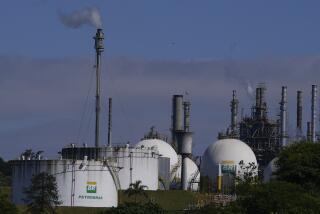OPEC Agrees to Modest Cutback in Oil Output
- Share via
WASHINGTON — The Organization of the Petroleum Exporting Countries agreed Thursday to cut its oil production modestly to keep prices from falling as world demand subsides in the spring and Iraq’s wells begin pumping again.
OPEC oil ministers emerged from emergency talks in Vienna to proclaim that they would reduce output by 2 million barrels a day, effective June 1, ending a recent bout of overproduction designed to keep storage tanks full during the war.
They created confusion by simultaneously announcing a 900,000-barrel-a-day increase in their official production quota, rather than the expected straightforward decision to adhere to the previous target of 24.5 million barrels.
“It confused a lot of people,” said George Beranek, manager of market analysis for PFC Energy, a Washington consulting firm. “But what really matters at the end of the day is that OPEC production is going to fall. OPEC is still trying to support the market and prevent any sort of supply overhang.”
Oil prices initially fell about $1 a barrel as markets tried to decipher the mixed message, then recovered as OPEC watchers decided it signaled at least some degree of restraint. Benchmark West Texas crude closed at $26.64 a barrel, down 1 cent, on the New York Mercantile Exchange. It was the lowest closing price in nearly five months.
The actions were taken by ministers from the “OPEC 10” nations: Saudi Arabia, Iran, Venezuela, the United Arab Emirates, Nigeria, Kuwait, Libya, Indonesia, Algeria and Qatar. Their new quota of 25.4 million barrels would supply about a third of total world demand of 77 million barrels.
OPEC’s 11th member -- Iraq -- was a no-show. Saddam Hussein’s oil minister now is an international fugitive, and no one has been named to take his place in a postwar interim government.
But Iraq has not been subject to OPEC quotas since 1991, and it may be months before its wells pump enough oil to supply export markets. Until the United States and the United Nations resolve who is in charge in Iraq, it has no legal authority to sell oil to foreign buyers anyway.
OPEC members will have another chance to assess Iraq’s role in the organization and its potential effect on oil prices when they meet again June 11.
“Essentially, this is a way of stalling until June to see what’s happening,” said Council on Foreign Relations economist Philip K. Verleger Jr.
The packaging of a quota increase with a production cut reflects the traditional gap between what OPEC says it will produce and the amount of oil it actually pumps. OPEC members overproduced with abandon in recent weeks in an effort to reduce market anxiety about war-related supply disruptions.
“We’ve seen this in the past,” Verleger said. “When everybody is overproducing, they finally say, ‘OK, nobody believes the quota any more, so let’s set the quota around where everybody is actually producing.’ ”
Several analysts said they believed the announcement signaled an actual intent by OPEC members, mainly Saudi Arabia, to reduce production by about 500,000 to 1 million barrels a day. That should be sufficient to keep oil prices from plunging, they said, but not necessarily enough to reverse the recent slide from prewar highs of about $38 a barrel.
“There’s no question they’re doing some tightening,” said Edward Morse, special advisor to Hess Energy Trading Co. in New York. “You know it through the commercial marketplace. The Saudis have cut back on their customers for April and May.”
OPEC said its production cut is designed to stabilize the average price of oil received by its members within a range of $22 to $28 a barrel. OPEC’s “basket price” is generally $2 to $3 a barrel lower than the spot price of West Texas crude, reflecting quality and transportation costs.
OPEC President Abdullah ibn Hamad al Attiyah of Qatar told reporters the new quota was based largely on expectations of sluggish world demand during the second quarter.
Times wire services were used in compiling this report.
More to Read
Inside the business of entertainment
The Wide Shot brings you news, analysis and insights on everything from streaming wars to production — and what it all means for the future.
You may occasionally receive promotional content from the Los Angeles Times.










